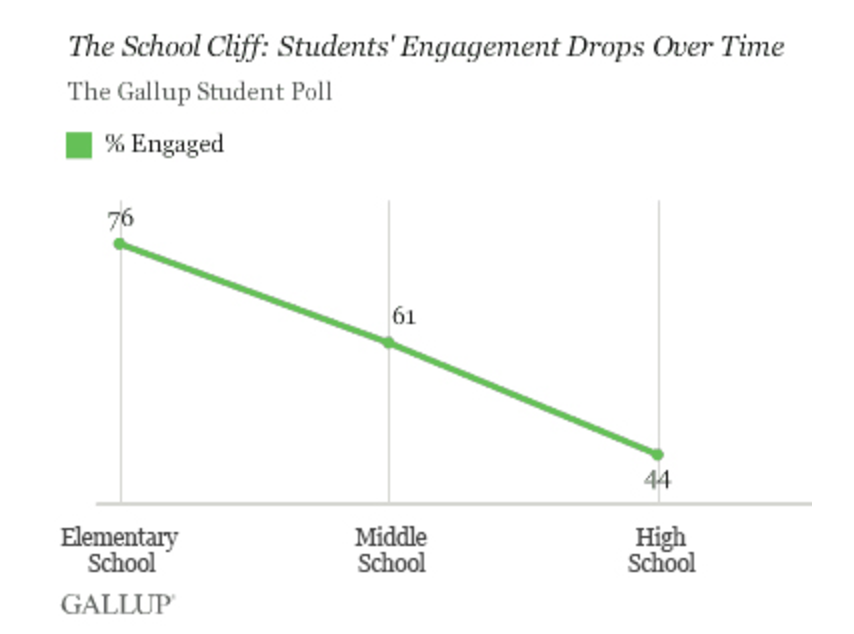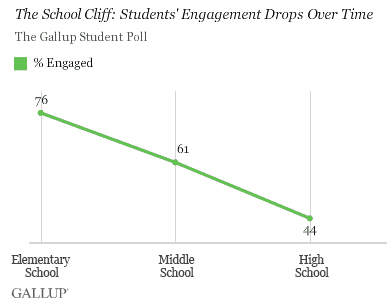Is our desire to be engaged, effective lifelong learners beaten down, if not killed outright by the time we leave high school? That may be too bleak a conclusion to draw, but the findings of a recent Gallup survey are disturbing nonetheless.
Gallup surveyed nearly 500,000 students in grades five through 12 from more than 1,700 public schools in 37 states in 2012 and found that by the time students get to high school only about 4 in 10 qualify as engaged.
As the writer of the Gallup blog post on the poll argues, you would hope these numbers would be exactly the opposite – that students would become more engaged as they go through school.
Larry Ferlazzo rightly points out that this is not a statistically valid survey: there was no random sampling involved; schools and students participated on a volunteer basis. Still, a sample of half a million is hard to ignore.
You could also debate whether the best possible questions were used to measure “engagement.” Here’s the set of questions (again, thanks to Larry for digging these up):
8. I have a best friend at school.
9. I feel safe in this school.
10. My teachers make me feel my schoolwork is important.
11. At this school, I have the opportunity to do what I do best every day.
12. In the last seven days, I have received recognition or praise for doing good schoolwork.
13. My school is committed to building the strengths of each student.
14. In the last month, I volunteered my time to help others.
I’m sure your average committee could debate these forever, but my main concern in administering this kind of survey would be that the same questions are asked in the same way across the group of participants – which does appear to be the case.
In the end, you can only rely so much on this or any other survey, but the results do reinforce the need for diligence in at least a couple of areas.
First, every lifelong learner – or budding lifelong learner – needs to be as conscious as possible of the forces that may dampen motivation and engagement. School is not the only place we encounter these of course – a significant amount of data suggests that engagement levels at work are often as bad or worse than what the Gallup poll shows for school. It’s worth asking yourself questions similar to those in the Gallup survey and see how you fare.
Second, parents – as always – need to be highly aware of the impact Education (with a capital “E”) as an institution can end up having on intrinsic motivation to learn. None of us want disengagement to be the result, of course, and I have no doubt that the average teacher works hard to keep students engaged. Still, when you move so many people through a large system, a certain amount of disengagement seems inevitable. Parental engagement in maintaining engagement and cultivating lifelong learning is essential.
What do you think? How much weight do you give to the Gallup poll results, and how concerned should we be about the current state of student engagement as a foundation for lifelong learning?
Jeff







Pingback: Four short links: 26 April 2013 - O'Reilly Radar
Pingback: Parent Communication in Education « SheilaSpeaking
Lori – Thanks for commenting and sharing your perspective. (And apologies for the slow response on my end – busy week!). I’ll have to look into Hallowel’s work – sounds very interesting. Definitely familiar with Angela Maiers’ efforts – she does great work. – Jeff
I think this poll is sadly reflective of the experience of too many of our nations students. Schools are still primarily focused on “teaching” – as in content delivery, and skill development- rather than, or with too little emphasis on “connecting”
Research in the fields of neuroscience and developmental psychology have underscored the importance of feeling valued, seen and cared about- to developing human potential-
According to Dr. Ned Hallowel, expert in ADHD- schools would be well served to focus more on raising connection scores rather than test scores.
Angela Maiers calls for a campaign that lets kids know unequivocally that they matter- that they have unique gifts and talents that the world needs.
There is a crisis in our education system- it is not fundamentally a systems or technical crisis- not one that can be solved by elevating test scores- it is a crisis of connection, of caring, of seeing and appreciating what is remarkable about each unique child, of cultivating strengths, passions and creativity…
Finland seems to have figured this out.
We can too.
We need to see and cultivate and acknowledge the value of each child- beyond their performance on this or that task, and in this or that subject. In this way, we will be best able to help them learn in a way that is effective, meaningful and engaging for them.